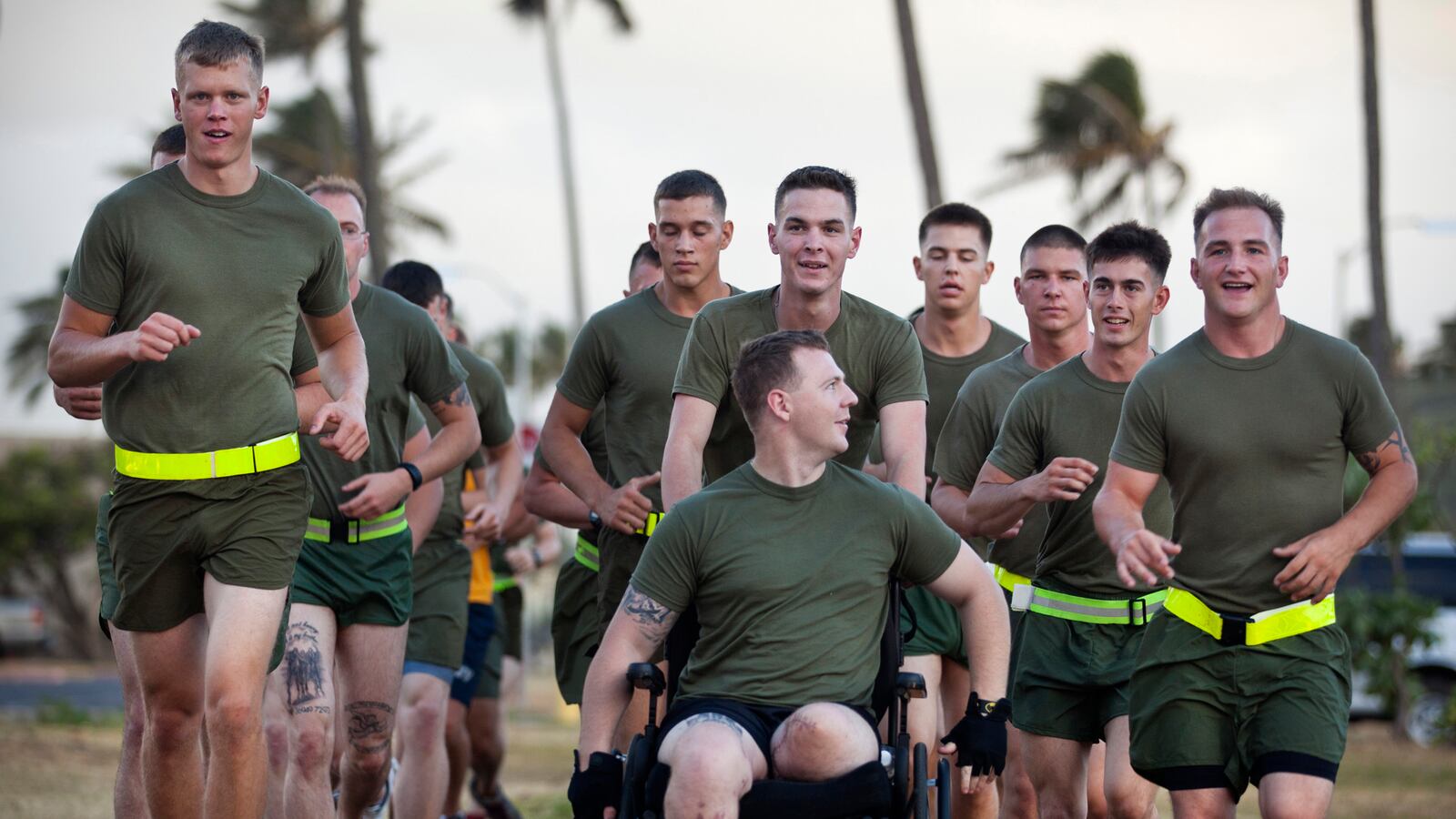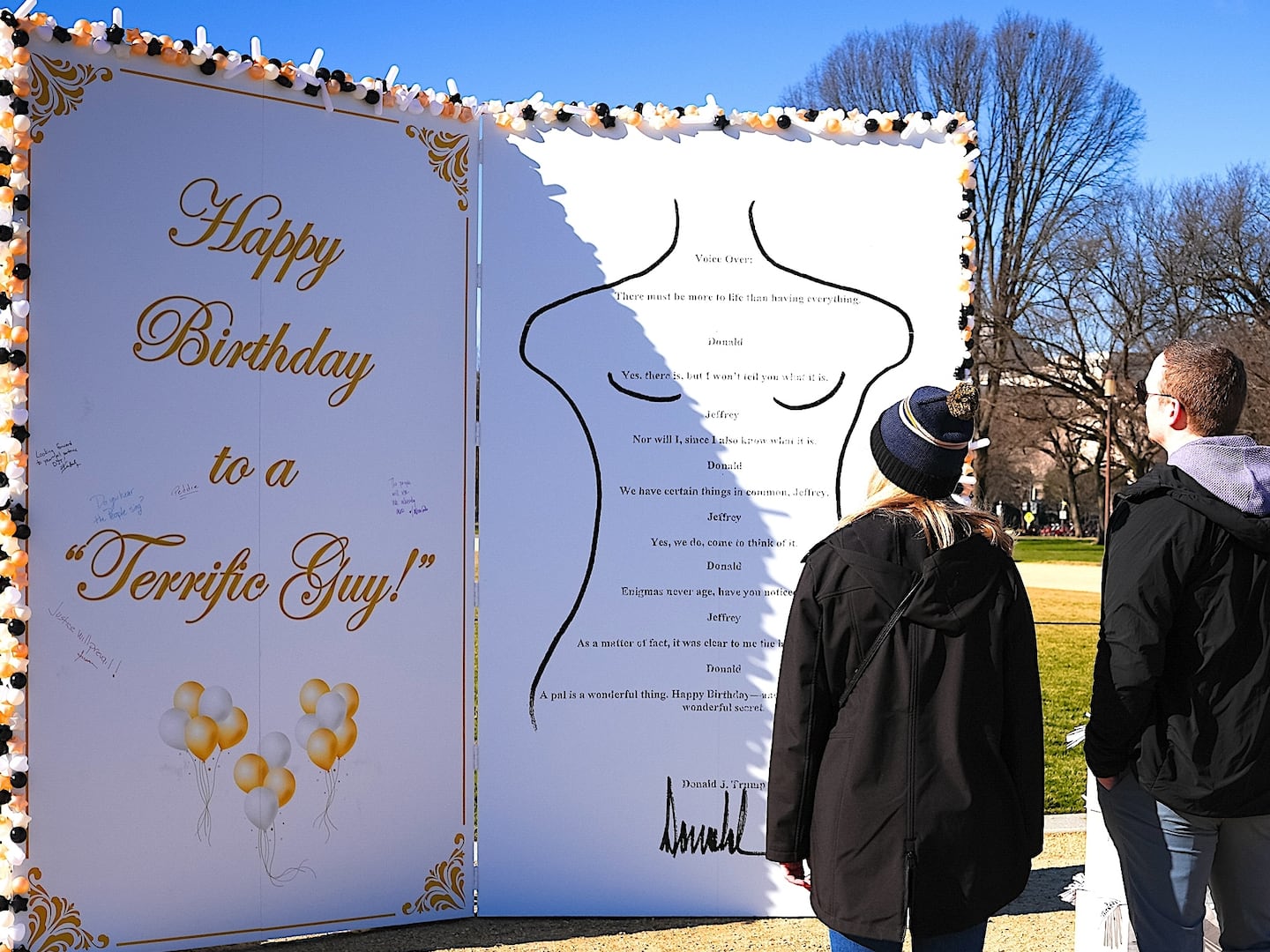No one ever seeks a Purple Heart medal, but it remains the most distinctive of American military medals and symbols. Charles Bronson, Lee Marvin, Colin Powell, Rod Serling, Kurt Vonnegut, JFK, and George Patton are among the many who have been awarded it in past wars. Our nation’s killed in action are also awarded medals, affixed by someone else before burial on their uniforms, where the medals stay.

Among many stories from America’s wars in Iraq and Afghanistan, here are those of two Marines, a young enlisted corporal and a leading general: Garrett Carnes and Larry Nicholson. Both feel lucky to be at home this Fourth of July. They met this spring for the first time at the Bethesda naval military hospital in Maryland in a modified physical-therapy gym designed for amputees. The Marines discussed their war-zone tours and how they had been wounded. Carnes said, “It’s always hit-and-miss when a high-up officer visits. Some don’t know what to say because of the generational difference. But with General Nicholson, well, it was like talking to one of my boys in the platoon. I could tell he cared.”
Corporal Carnes
On Feb. 19, 2012, a bomb filled with HME (fertilizer-based homemade explosives) detonated under Carnes in the yellow desert of Afghanistan’s Helmand province. At age 22, both legs were gone. In recounting what happened, he told me one leg “knocked out” a buddy as it flew through the air (his friend was OK). The Marine had lost a lot, but not his war-front sense of humor. He later returned to his unit, part of “America’s Battalion,” in Hawaii and participated in a run honoring him. Sgt. Reece Lodder, a combat correspondent who deployed to Afghanistan alongside Carnes, captured the moment. Lodder remarked, “Corporal Carnes’s life changed when he lost his legs, but the radical physical change hasn’t dampened his warrior spirit.”

Carnes has undergone “about 25” surgeries. His wife, Courtney, has been at his side throughout. President Obama awarded Carnes his Purple Heart Medal, which he described as “a real honor, a big deal. The president knew all of our names and stayed awhile. He didn’t just turn around and leave. I will always remember that day.” It just so happened that the commander in chief’s Feb. 27 visit coincided with Carnes’s wife’s birthday. “We got my Purple Heart on her birthday.”
While undergoing care, Carnes sought out an internship in the prosthetics department at the hospital. His goal, he said, was “to learn how prosthetics work, not just be a recipient who wears them. I want to help other wounded soldiers and Marines understand that it gets better.” He still remembers the day he received his first leg’s arrival: “April 19th, and a week later, I got my second leg.”
General Nicholson
On September 14, 2004, insurgents fired a 122mm rocket through the office window at Camp Fallujah of then-Col. Larry Nicholson. Earlier that day, he had assumed command of the First Marine Regiment. When the rocket impacted, it killed a Marine communications officer, Maj. Kevin Shea, immediately. Nicholson was badly wounded by shrapnel, with large chunks of his shoulder blasted away. Medics carried him into Fallujah Surgical for an immediate tracheotomy.
Transiting through medical facilities in Germany, he checked into Bethesda. After four weeks of stateside recovery and more surgeries, he walked for the first time since being wounded. Catheters and bandages removed, a Navy nurse helped keep him steady. In the hallways, he limped foot by foot, resembling the slow shuffle of a geriatric ravaged by decades of arthritis, not a Marine regimental commander and infantry officer decades younger.
He noticed an “old-timer” in a red USMC baseball cap sitting nearby with a few other Marine Vietnam veterans. They stared as he passed. He overheard one of them telling his buddies, “in a poor and rather unmuted attempt at a whisper”: “See that fehhllarrr. He was the commanding officer of First Marines in Fallujah. We must sure as hell be losing this damn war if they are starting to shoot our colonels.”

Nicholson later told me, “That was the first time I laughed in a long, long time. It was a deep, honest laugh—guess they call it a belly laugh, as your gut starts to hurt—and it felt amazing, cleansing, and cathartic.”
On Christmas Eve that year, Nicholson arrived back in Iraq.
***
The Bethesda naval hospital is one of the U.S.’s premier veterans medical facilities. The most severe cases are transferred there. The hospital has treated thousands of veterans from Iraq and Afghanistan. Over several visits, I have come to appreciate its unique atmosphere: shock, pain, pride—and resilience.
Bethesda’s fourth floor is where U.S. Marines have filled room after room since 9/11. Only in the past few weeks have support staff told me that numbers are down: “We are low in count, and it seems to be staying that way.” On this Fourth of July, the area is as quiet as it has ever been.
America’s longest war is coming to an end.
A friend of mine wounded by a child suicide bomber in Afghanistan’s Uruzgan province met first lady Michelle Obama on the fourth floor. Unlike other famous visitors and busy politicians, she lingered, and she told him upon leaving, “We need to bring all of you back home from over there.” The freckled Marine officer and native Chicagoan replied, “I think a lot of Americans would agree with you.”
***
After I left Afghanistan in summer 2010, a friend gave me a fitting memento made up of parts of an IED unearthed in Now Zad district in Helmand province. U.S. Marines, U.K. troops, and Afghan forces have spent years clearing the area of insurgents, including in places they nicknamed Pakistan Alley and Sherwood Forest.
The plaque reads:
“Pressure-plate for an improvised landmine constructed by the Taliban out of a humanitarian cooking oil can donated by the American people.”
The can’s metal plating shows the blue USAID symbol, below which, mostly rusted away, is the agency’s signature handshake.
***
Last month Nicholson took command of the storied First Marine Division based at Marine Corps Base Camp Pendleton, California. The general’s wife, Debbie, told me that since 9/11 there has been only one year, 2008, when her husband or two sons (both Marines) have not been deployed. They currently have a son leading patrols around Camp Leatherneck, in Helmand.
This past week Carnes moved back home to North Carolina with Courtney. He has been medically retired from the Marine Corps and lives “just down the road” from a prosthetics company—so close, in fact, he says, “I can walk there if I need any work done.” He is driving his “Dallas Cowboys blue” Dodge Ram 1500 truck on his own. He and his wife have two dogs, “though one looks like a cat,” and are figuring out where to spend their delayed honeymoon. He will use the post-9/11 GI Bill to enroll at the University of North Carolina, Charlotte, in spring 2014.

While the corporal and general are now home in California and North Carolina, each plans to return to visit those still-Bethesda-bound veterans with Purple Hearts who will spend more holidays there. Nicholson put it this way:
“My connection to Corporal Carnes and all the other wounded warriors is that of a special bond between warriors. I never tell a wounded Marine that I too was wounded until the end of my visit. When I do, I can tell that it connects instantly in a way that others might not understand. When wounded warriors meet, there are shared stories and experiences that melt away age, rank, and position. I notice that when young Marines learn that I was also wounded, they open up and share things that most other senior officers would never hear. This is a gift I have been given, borne from the great pain and the loss of a brother Marine on that terrible evening in Fallujah nearly nine years ago.”
Carnes told me from Mooresville, North Carolina, that, on this Fourth of July, he hopes Americans “do the barbecues and fireworks and all that, but also remember, it is not just another holiday. It marks our independence. We all should think about the men, women, and families who continue to give.”
Carnes and Courtney will spend their holiday with another Marine double amputee and his wife just outside Marine Corps Base Camp Lejeune in Jacksonville, North Carolina. “It’ll be two couples, three dogs. And my friend and I will have four new legs between us.”






